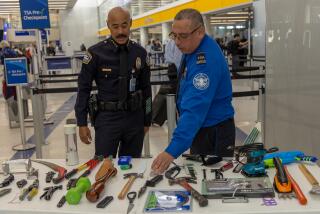Unscreened Air Cargo May Pose Security Threat
- Share via
WASHINGTON — Although airline passengers go through extensive and sometimes invasive security screening, the cargo in the hold beneath their seats is barely checked, a federal report says.
The report, issued Wednesday by the Government Accountability Office, identifies significant vulnerabilities in the Department of Homeland Security’s policies for guaranteeing the safety of the 23 billion pounds of commercial cargo shipped by air every year.
The report was prepared at the request of five House members from both parties.
“Americans need to know that their sneakers may be inspected but that objects the size of a car are waved onboard,” said Rep. Edward J. Markey (D-Mass.), a member of the House Select Committee on Homeland Security. “The GAO’s report blows away the Bush administration’s smokescreen that the current measures keep Americans safe.”
Since the Sept. 11 attacks, several stowaways have been found hiding in cargo aircraft, leading security experts to consider such planes as potential terrorist weapons.
In late 2003, Homeland Security officials said intelligence indicated that Al Qaeda might hijack cargo planes to attack nuclear plants and other facilities.
Corey Caldwell, a spokeswoman for the Assn. of Flight Attendants, said that the pre-boarding screening of passengers created a “false sense of security,” because cargo on those planes went unchecked. About half of the baggage hold on a passenger jet is allotted to unaccompanied cargo.
“This study reveals the gaping hole in air cargo security that continually puts flight attendants, passengers and pilots at risk every day,” Caldwell said. “This isn’t anything new ... but I hope Congress now sees the urgency of the issue.”
Although the Bush administration created a plan in November 2003 to secure air cargo, officials have yet to complete it, the report said. The plan outlined a commitment to inspect “100% of elevated-risk cargo” and to ensure the safety of all cargo. Of particular interest was preventing the possibilities that explosive devices could be placed aboard passenger jets and that cargo aircraft could be hijacked.
The Transportation Security Administration, part of Homeland Security, does not require inspection of all cargo. It makes random checks of some items but exempts others from inspection. The cargo exempt from inspection was not identified in the report for security reasons.
“The Bush administration has no good argument as to why they don’t screen all cargo,” Markey said. “The back door is wide open, and Al Qaeda can exploit that.”
Kevin Hufford, an avionics technician who worked at Northwest Airlines in Chicago for 17 years, said his experiences with Boeing 747 cargo planes showed him the extreme laxity of security requirements.
“The scenarios were always situations where we asked ourselves: ‘Where and when is this stuff getting inspected?’ ” Hufford said. “It seemed like a very easy place for somebody to operate if they had really bad intentions.”
In Los Angeles, airport officials said they relied on a federal program requiring airlines to establish business relationships with shippers to ensure that their cargo was safe.
“The confidence I have in it is the fact that nothing has happened since 9/11,” said Michael DiGirolamo, a deputy executive director for Los Angeles World Airports, which operates Los Angeles and Ontario international airports. “If this was such an easy vulnerability, why hasn’t someone taken advantage of it?”
Bomb-sniffing dogs are used to screen about 10% of cargo at LAX as part of a confidential program operated in conjunction with the airlines, he said.
In a related -- but rare -- incident, about 60 employees were briefly evacuated Wednesday from a Qantas cargo facility near LAX after an alarm sounded on a machine scanning a container for explosives. The Los Angeles Police Department bomb squad responded to the building on west Imperial Highway and tested the crate, which turned out to contain aircraft parts.
Screening all of the 1.9 million tons of cargo that flows through LAX, the nation’s second-busiest international airfreight gateway by value of shipments, would be cost prohibitive and could deter carriers from shipping goods by air, aviation experts said.
A report done by freight shippers in Southern California in 2002 found that installing the infrastructure to screen cargo at LAX alone would cost $850 million, not including the staff required to operate it. LAX officials say that even if such a system were mandated, they don’t have the space to install it.
Los Angeles companies that move cargo from airports to businesses around the country said they were required to prove to the airlines that they were complying with federal rules that required them to know what they were shipping and its origin.
“All the freight we ship in Los Angeles, we see nearly all of it and we touch it all,” said Chris Coppersmith, president and chief executive of Target Logistics Services, a nationwide freight shipper that handles high-end electronics and fashion. “It comes 100% from shippers we know.”
Inspectors with the Transportation Security Administration visit his office every three to six months to cross-check cargo records provided by airlines to ensure that individual shipments have been documented, he said.
Shippers cautioned that a program to screen all cargo put on aircraft in the U.S. could back up a system that relies on timely delivery, forcing companies to move cargo by truck.
Brandon Fried, executive director of the Airforwarders Assn., which represents the air cargo industry, said that although he recognized the need for improvements, his organization would continue to support the Transportation Security Administration in its efforts to identify and inspect primarily high-risk cargo.
“It is necessary to understand the nature of cargo transportation before imposing costly and unwieldy solutions that would bring cargo transportation to a virtual standstill, resulting in higher costs for America’s companies and consumers,” Fried said.
*
Vaughn reported from Washington and Oldham from Los Angeles.
More to Read
Get the L.A. Times Politics newsletter
Deeply reported insights into legislation, politics and policy from Sacramento, Washington and beyond. In your inbox twice per week.
You may occasionally receive promotional content from the Los Angeles Times.










